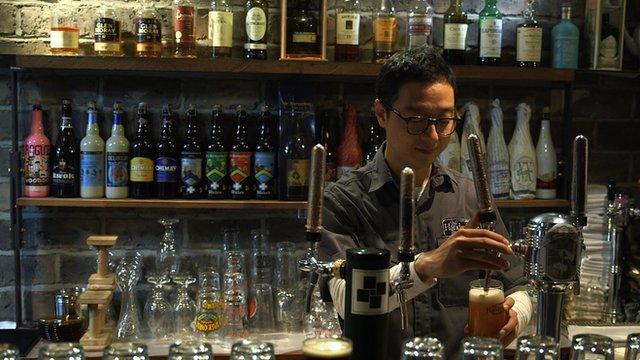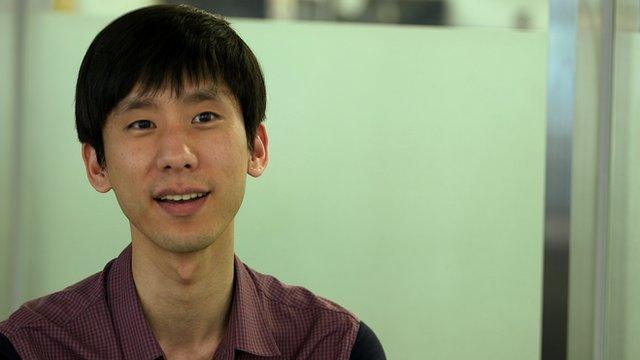Seoul traders: Swapping job security for start-up thrills
- Published
Can Korean start-ups really challenge the corporate giants?
According to micro-brewery entrepreneur Bryan Do, it takes courage to start a company in South Korea.
"My mother-in-law begged me not to quit my job [at Microsoft]," he says.
Secure positions at multinational firms are highly prized in South Korea - Mr Do says his friends regarded him as "really crazy"' for giving his up.
A Korean-American, Mr Do moved to Seoul shortly after graduating from the University of California, Los Angeles.
After an eclectic career, which included stints in PR, roles at tech start-up firms - and even a spell as a TV quiz show host - he ended up working in a senior role at software giant Microsoft for many years.

Interest in craft beer has grown rapidly in South Korea
Mid-life crisis?
But after a while he wanted a change.
"I wanted to show that….you can be successful in doing something else, rather than what you've been doing for the majority of your life," he says.
He admits that there may also have been an element of a mid-life crisis behind his decision: "Instead of buying the Porsche, I started a company."
Mr Do had a long-standing interest in beer, and after opening a pub in Seoul that specialised in craft ales, he moved on to brewing beer himself.
He says that, although at the time home brewing was growing in popularity in South Korea, craft beer was still little known. He gave out free samples to encourage interest.

Bryan Do says competition from bigger players isn't necessarily a bad thing
The threat of the giants
According to Mr Do, trends come and go fast in the Korean market, and he says it was not long after launching his brewery that interest exploded in the craft beer scene.
But this gave rise to a potential problem. Over the past few decades, business in South Korea has been dominated by huge, multi-divisional corporations, such as Samsung, Hyundai and others.
Mr Do says these giants like to be involved in all aspects of the economy - it would be natural for one or more of them to move quickly into the craft brewing sector.
Despite the threat of fierce competition from the conglomerates, he says there may be a silver lining. He believes that, unlike him and other smaller players, the corporate giants have the marketing firepower to raise awareness of craft beer amongst consumers to another level, thus benefiting everyone involved in the market.

Weddings in Korea are big business, with an estimated 300,000 couples marrying each year
Wedding bells
But there are other Korean entrepreneurs who are keener to move out from under the shadow of the country's conglomerates.
"In Korea, small businesses eventually end up relying heavily on bigger companies - I don't want to end up in that kind of situation," says Kim Tae-wook.
He is founder of iWedding, one of the biggest weddings organisers in South Korea.
Mr Kim is a former singer. Disaster struck when problems with his vocal cords meant he had to give up singing for two years.
"The most difficult thing for me was losing my dream [of being] a musician," he recalls. "It was as though I was given a death sentence."
He began to look for a new goal to pursue. The idea for starting a business came when he was trying to organise his own marriage to TV and film actress Chae Shi-ra.

Kim Tae-wook says organising his own wedding made him realise how unprofessional the sector was
He says he found the process chaotic: "Consistent service was not available - even the price for similar products varied from place to place."
He hopes that his company has played a role in bringing more professionalism to the sector.
The firm has organised 120,000 weddings so far, and now has its eyes on even bigger markets abroad.
"In Korea, about 300,000 couples marry each year, but in China over 10,000,000 couples marry each year," says Mr Kim. "It's a huge market."
He believes that the service expertise his company has already acquired will enable it to expand successfully in China, where he sees the market as being in some way similar to how it was in South Korea a decade or so ago.

Jake Park says hiring the right local staff is crucial for firms trying to expand overseas
The challenges of expanding
With intense competition at home from giant companies, it is obviously tempting for start-ups to look for growth possibilities abroad.
But Jake Park, of social media company VCNC, warns that Korean entrepreneurs should take nothing for granted.
"Our biggest challenge is globalisation," he says.
Mr Park's company has developed Between, a social media app aimed at couples, which already has millions of users.
When it comes to international expansion, he says the key is hiring the right local staff. One particularly talented employee in Japan helped the firm make a lot of progress in the market there, he says.
Investors say it is wise for the new wave of Korean enterprises to look for opportunities both at home and abroad. But some wonder whether they are hungry enough for success.
The entrepreneurial talent available in South Korea is exceptional, says Fortune Sohn, from venture capital firm Stonebridge Capital.
"But one problem is that they are not as aggressive as our Western counterparts," he says.
This is not necessarily a bad thing, he adds, but it is certainly something that all stakeholders need to be aware of.
Leadership expert Steve Tappin agrees. Korean entrepreneurs can have a bright future as long as they are "willing to adapt - and take a lot more risk," he says.
This feature is based on interviews by leadership expert Steve Tappin for the BBC's CEO Guru series, produced by Neil Koenig.